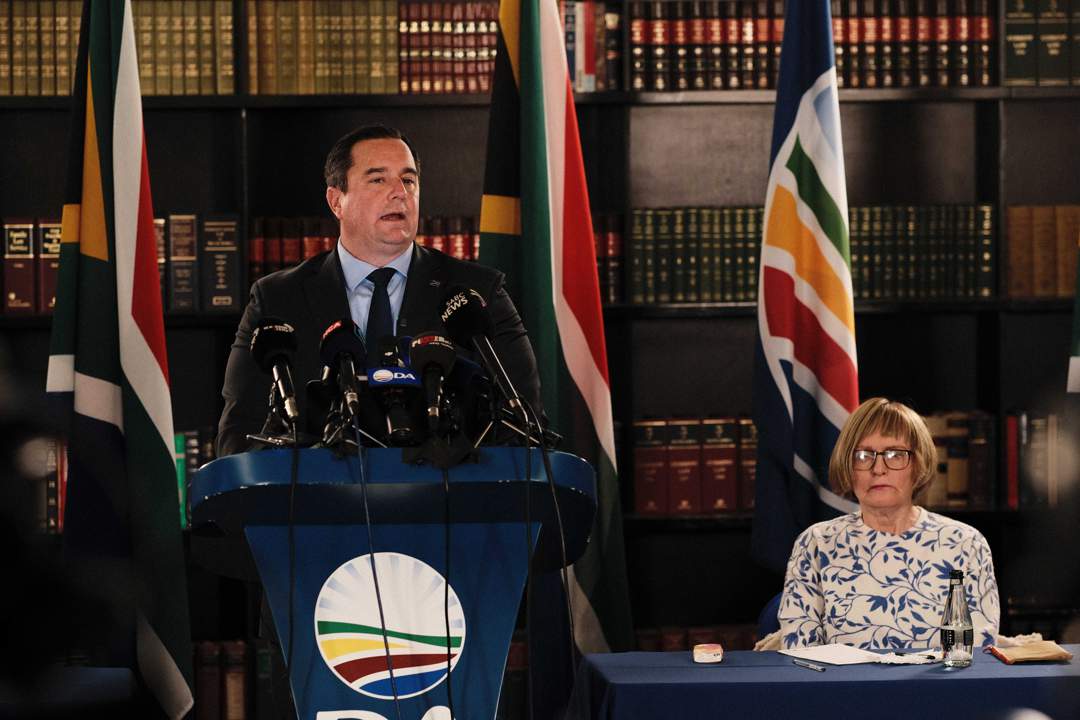The political fallout from President Cyril Ramaphosa’s dismissal of Democratic Alliance (DA) Deputy Minister Andrew Whitfield has plunged the Government of National Unity (GNU) into a state of uncertainty, underscored by the DA’s confusing response. While the party has vehemently protested the axing, its subsequent actions have been labelled as incoherent, leaving many to question its ultimate strategy within the year-old coalition.
The crisis was ignited when President Ramaphosa fired Whitfield from his post as Deputy Minister of Trade, Industry and Competition last week. The official reason cited was a breach of the ministerial handbook for undertaking an unauthorised, party-funded trip to the United States. The DA, however, has framed the dismissal as a “calculated assault” and a “flagrant double standard,” pointing out that Whitfield had requested permission for the trip but received no response from the Presidency. DA leader John Steenhuisen contrasted this with what he described as lenient treatment of ANC ministers accused of serious misconduct.
In response, the DA issued a 48-hour ultimatum to Ramaphosa, demanding he apply the same standard to allegedly corrupt ANC ministers. When the deadline passed without action, the DA announced a series of retaliatory measures. However, these measures have created what political analyst Professor Ntsikelelo Breakfast calls a “paradox,” highlighting a deep-seated conflict within the DA’s approach.
SMread: Doubts Cast on Rwanda-DRC Peace Deal
A Confusing Way Forward
The DA’s Federal Executive resolved to remain in the GNU but simultaneously announced it would withdraw from the upcoming National Dialogue, a forum intended to address the nation’s socio-economic challenges. The party also vowed to vote against the departmental budgets of ministries led by ANC members it accuses of corruption, such as Thembi Simelane and Nobuhle Nkabane.
This dual strategy of staying in government while actively opposing key government initiatives has drawn criticism. The ANC has called on the DA to clarify its position, asking whether it is a “genuine and principled partner in the GNU, or is it positioning itself as a quasi-opposition within the executive?” ANC Secretary-General Fikile Mbalula has been more blunt, suggesting the DA is looking for an exit and assuring that the GNU would not collapse even if the DA were to leave, as other parties are ready to join.
The most significant contradiction lies in the DA’s threat to table a motion of no confidence in President Ramaphosa. While it has put this option on the table, the party has simultaneously acknowledged the danger of such a move. They fear that removing Ramaphosa could collapse the GNU and pave the way for a coalition involving the Economic Freedom Fighters (EFF) and uMkhonto weSizwe (MK) party, an outcome the DA has repeatedly warned against.
Professor Breakfast highlights this internal conflict: “On the one hand, they put this idea on hold as of now. Why? Because it might make the GNU collapse… On the other hand, they say when the president does not give in to the demand, then they are going to institute this motion of no confidence. But you can’t have it both ways.”
Image: DA leader John Steenhuisen and federal council chairperson Helen Zille at a media briefing in Cape Town, where the DA announced it would not participate in the National Dialogue. [News24]
